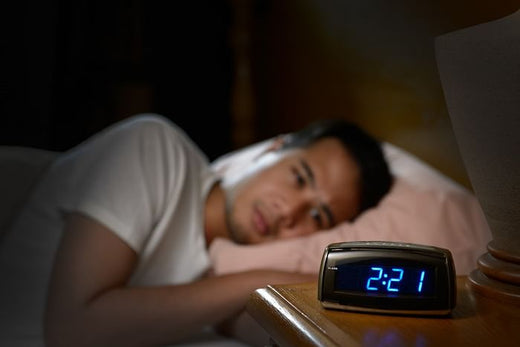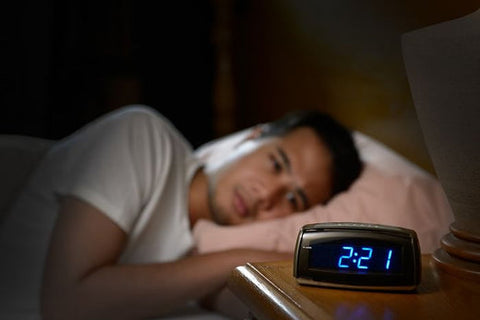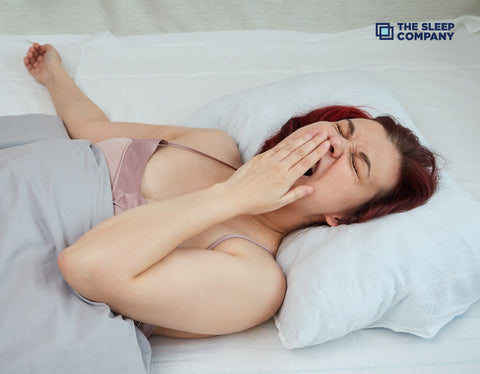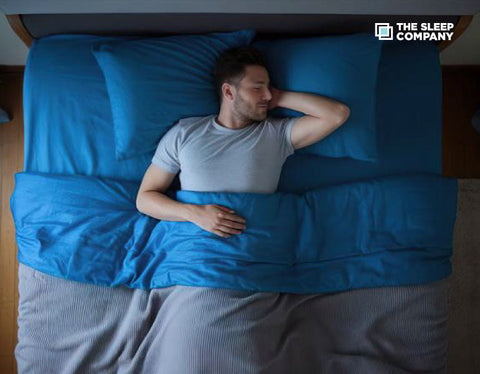My Cart

The Five Most Common Sleep Disorders

Every living thing needs a certain amount of uninterrupted and peaceful sleep to lead a healthy and normal life; as stated in the Irish proverb, “A good laugh and a long sleep are the greatest cures in the doctor’s book.” However, many people struggle with sleep-related conditions that, if not treated promptly, can lead to serious physical, cognitive, interpersonal, and psychological issues.
The term “sleep disorders” refers to a variety of conditions that can interfere with your regular sleeping patterns for one or more reasons. Most of the time, these disorders are categorised depending on their severity, symptoms, and reasons. Thus, here are some common sleep disorders with their symptoms and reasons
1. Insomnia

The most widely used and recognized term “insomnia” is a sleep disorder in which you have trouble falling or staying asleep. Many people confuse Insomnia with other sleep disorders.
Types
Insomnia can be classified as transient, acute, or chronic, depending on how long it lasts.
- Transient Insomnia is mostly a state of sleep deprivation that lasts for less than a week.
- Acute Insomnia can last anywhere from one night to a few weeks. Chronic Insomnia is the most severe condition that can last for months and more than three nights a week go without sleep.
Symptoms
It can be diagnosed as Insomnia if you have one or more of mentioned symptoms:
- Difficulty in falling asleep or staying awake late at night
- Waking up during the night multiple times or waking up early
- Fatigue and tiredness in the daytime, anxiety, irritability, or depression
- Difficulty in concentration or memorizing tasks and increased number of errors
Causes
There could be several reasons that can cause Insomnia:
- Stress, depression or Other health issues, medications
- Poor sleeping habits like sleeping late, watching television or mobile before sleeping,
- Long working hours, rotational shift timings, constant traveling, jetlag, different time zones
- Poor sleeping conditions like old mattresses, pillows, cold weather, noisy surroundings,
- Poor eating habits like overeating, or not eating at all late dinner, or excessive consumption of caffeine, nicotine, alcohol, etc
Prevention
Exceeding good habits can help you avoid getting caught in the web of Insomnia
- Have a consistent bedtime and wake time even on weekends
- Be active and do regular exercise to help you fall asleep
- Avoid or control naps during daytime
- Follow the diet, avoid eating a heavy meal just before going to bed, control the use of caffeine, alcohol, nicotine
- Make your sleeping area comfortable by using the correct mattress, pillow, and peaceful environment
- Check your medications to whether they have any effects on your sleep If, despite taking all measures, you find it difficult to sleep, consult doctors
2. Sleep Apnea

Sleep apnea, or sleep apnoea, is considered one of the most serious sleep disorders where your breathing stops for some time or becomes slower during slumber.
Types
- Intrinsic type disorders fall under the first classification, in which the internal oscillation is altered. Sleep disorders fall into this category: irregular sleep phase disorder, idiopathic and psychophysiological Insomnia, narcolepsy, obstructive sleep apnea syndrome, periodic limb movement disorder, and restless legs.
- Extrinsic type disorders occur when the endogenous circadian clock and the external environment are out of sync. Sleep disorders that fall into this category are shift work disorder, jet lag,
Sleep apnea can be divided into three types: Obstructive, central or complex.
- Obstructive sleep apnea is the most common sort where your airways become entirely or partially blocked during sleep. It happens due to the failure of soft tissues in the back of your throat, reducing the amount of oxygen reaching your organs and causing irregular heartbeats.
- Central sleep apnea occurs when your brain cannot signal your muscles to breathe due to issues with the respiratory control system.
- Complex sleep apnea, also known as treatment-emergent central sleep apnea, is a combination of obstructive and central sleep apnea.
Symptoms
Sleep apnea can be diagnosed by one or more signs mentioned below.
- Breathing-related issues like loud and irregular snoring, stopped breathing, which is noticeable by the third person and gasping for air during sleep.
- Insomnia, hypersomnia, daytime sleepiness, or other disorders
- Night sweats, constant need to pee during the night,
- Dry mouth, headaches, tiredness when waking up and throughout the day,
- Troubles while trying to concentrate, remembering stuff, irritability, depression, anxiety
Causes
Sleep apnea can occur due to various reasons:
- Excess weight and obesity, Neck circumference, a narrowed airway, nasal allergies,
- Medical conditions like high blood pressure, type 2 diabetes, congestive heart failure, stroke, Parkinson’s disease, hormonal disorder, polycystic ovary syndrome, chronic lung diseases like asthma
- Age, family history, uses of sedatives, alcohol, nicotine,
- Men have more chances of having central sleep apnea than women.
Prevention
Due to the severity of the diseases, it’s hard to treat them without any professional doctor’s help. However, one can take precautions along with doctor’s treatment to make a speedy recovery, like:
- Mild changes in lifestyle, change in sleep habits, eating habits, lose your weight
- Do exercise, yoga, pranayam etc.
- Avoid consumption of alcohol, nicotine,
- Treat nasal allergies, if any, and avoid medicines like anti-anxiety pills, sleeping drugs
3. Circadian Rhythm Disorder

Circadian rhythm is the natural cycle that controls our body’s sleep-wake timings daily and regularly repeats after 24 hours. Thus, circadian rhythm disorders are a group of sleep disorders that disrupts our natural cycle, making it difficult to sleep and wake up on time without any glitch.
Types
Circadian rhythm disorders are divided into two groups based on their causes: intrinsic and extrinsic.
Symptoms
Circadian sleeping disorders can be diagnosed with symptoms like:
- Insomnia, sleep loss, disrupted sleeping pattern
- Excessive daytime sleepiness, difficulty in waking up in the morning,
- Depression, stress, anxiety,
- Poor work performance, inability to meet social obligations
Causes
Several causes can affect your circadian rhythm, creating sleep disorders
- Frequent changes in working hours, sleep-wake time, lack of proper sleeping habits,
- Poor exposure to sunlight for long hours, jet lag, constant travelling,
- Prior medical conditions like stroke, dementia, and a head injury can cause further brain damage
- Age, genetic disorders, medications
Prevention
Depending on the type of circadian rhythm disorder, you can adopt the following methods:
- Changes in lifestyle, sleeping time, eating habits
- Bright light therapy, chronotherapy, medications
- Daily exercise, yoga, mindfulness, meditation
- Avoid uses of excessive screen time and heavy meals before going to bed
4. Narcolepsy

Narcolepsy, a long-term neurological condition that significantly impacts your sleep-wake cycle, is another severe sleeping disorder. Because of its overlapping symptoms, narcolepsy can be confused for Insomnia, sadness, anxiety, or obstructive sleep apnea.
Types
Narcolepsy can be categorised into two types: type 1, type 2 and secondary narcolepsy.
- Type 1 narcolepsy, also known as narcolepsy with cataplexy, affects people who often exhibit severe forms of excessive daytime drowsiness and cataplexy and low levels of brain chemicals.
- In type 2 narcolepsy, also known as narcolepsy without cataplexy, excessive daytime sleepiness occurs without cataplexy or loss of muscle weakness brought on by emotions. Compared to type 1 narcolepsy, it’s less severe.
- Secondary narcolepsy may occur when an individual suffers an injury to the hypothalamus, a sleep-regulating region in the deep brain.
Symptoms
Narcolepsy, a life-long problem, can show various symptoms in more or less severity without going away completely.
- Excessive daytime sleepiness is the major and most obvious symptom of narcolepsy.
- Cataplexy where the individual feels sudden weakness in their muscle tone or loses control over them due to sudden emotional changes
- Sleep paralysis where an individual becomes unable to move or speak during sleep or at the time of awakening.
- Hallucinations, fragmented sleep, Insomnia, automatic behavior, etc.
Causes
Narcolepsy can be caused due to
- Lack of hypocretin, i.e. a brain chemical,
- Major psychological disorder, stress, brain injuries
- Hormonal changes, genetic disorders,
- Infections like swine flu or taking flu vaccines
Prevention
Although narcolepsy is a chronic condition, there are steps one may take to manage it, like
- Follow a strict schedule, sleep habits, and eating habits
- Take naps, do exercise, do yoga,
- Avoid alcohol, caffeine, nicotine
- Avoid unnecessary medicines
- Seek doctor’s advice
5. REM Sleep Behaviour Disorder

REM or Rapid eye movement sleep behaviour disorder (RBD) involves abnormal behaviour during REM sleep where individuals face loss of muscle atonia or the loss of paralysis and act out their dreams. REM sleep behaviour disorder can be associated with neurological disorders like Parkinson’s, multiple system atrophy, or Lewy body dementia.
Types
RBD is a type of parasomnia and is distinguished into two categories, namely, idiopathic or symptomatic
- Idiopathic RBD is not associated with any ongoing neurological disorders.
- Symptomatic RBD is the term where the cause of the disorder is known, and symptoms are visible.
Symptoms
Symptoms of REM sleep behaviour disorders can include:
- Physical acts such as kicking, jumping out of bed, punching,
- emotional behaviours such as sobbing, laughing, chatting, and having emotional outbursts
- waking up during the episode and recalling nightmares
Causes
The causes of REM sleep behaviour disorders can be
- Narcolepsy, other neurological disorders like Parkinson’s disease, multiple system atrophy, or Lewy body dementia,
- Uses of medications, anti-depressants,
- Excessive use or sudden withdrawal from alcohol, nicotine, drugs
- Being male or above 50 years’ old
Prevention
REM sleep behaviour disorder can be treated by using the following methods:
- Medical treatment, medications, melatonin,
- Changes in diet, lifestyle, avoiding alcohol, drugs,
- Taking precautions like removing harmful objects from the bedroom, keeping pillows around the bed or keeping the mattress on the floor to avoid any injuries
- Treating other diseases related to RBD
Apart from these major sleep disorders, many other sleep-related disorders can be seen in individuals due to changed lifestyles or other factors like non-24-hour sleep-wake disorder, restless leg syndrome, periodic limb movement disorder, shift work disorder, etc.
Though it can be scary and troublesome to have sleeping disorders, one can maintain a balanced life with proper treatment and precautions.
FAQs
To manage a sleeping disorder, keep a regular sleeping schedule, and develop a bedtime routine that promotes relaxation. This can be aided by reducing one's exposure to screens before sleeping, managing stress, and reducing caffeine intake a few hours before bedtime. Seek professional advice for further assistance.
Even though most common sleep disorders can be treated or even cured with proper treatment, lifestyle changes, cognitive behavioural therapy, and medication, if necessary, make a big difference in sleep quality and mental health.
Insomnia, which is characterised by failing to sleep or staying asleep, is the most prevalent among adults. It often results in negatively influencing mental health by creating a sense of stress and fatigue.
Poor sleep can negatively impact mental health, increasing stress, anxiety, and mood swings. Quality sleep is essential for emotional balance and overall well-being.
Sleep disorders can be identified through symptoms like daytime fatigue, difficulty concentrating, or frequent waking. They can impact health by causing poor mental health, weakened immunity, and chronic conditions.





























































